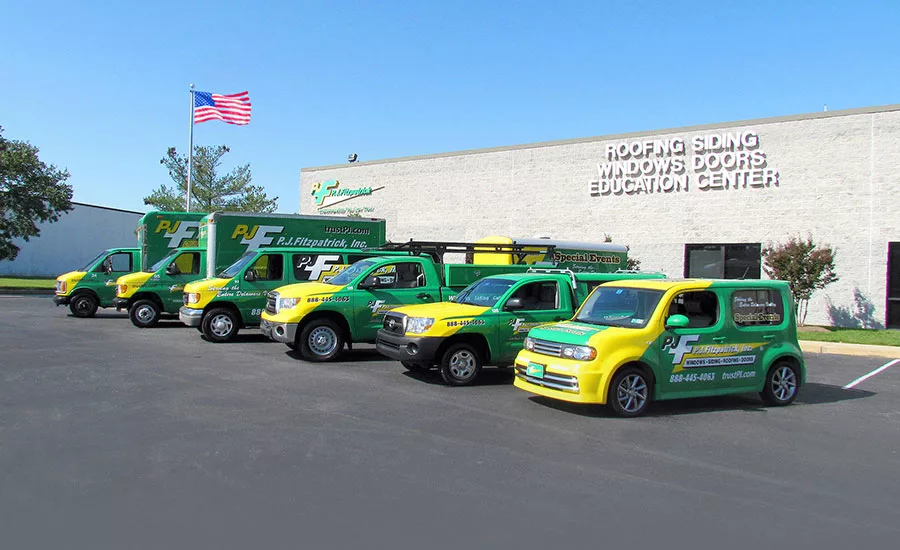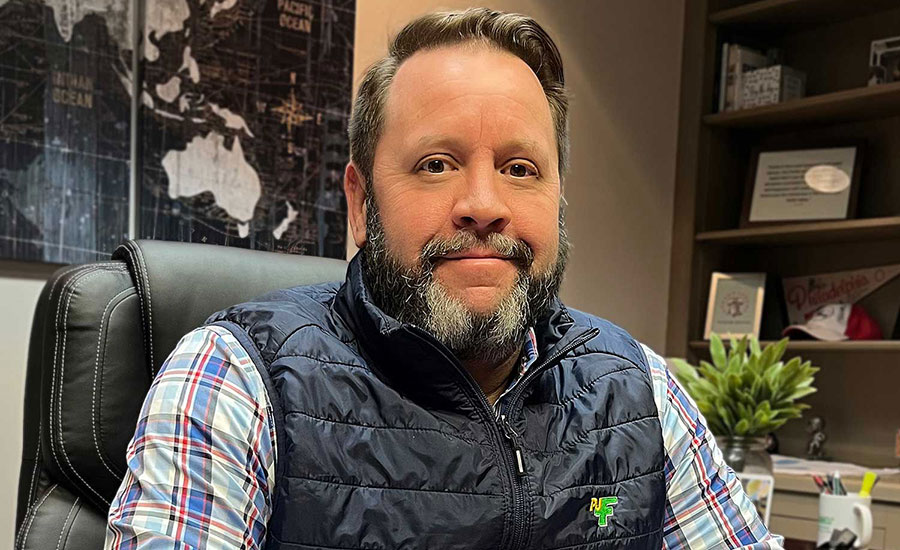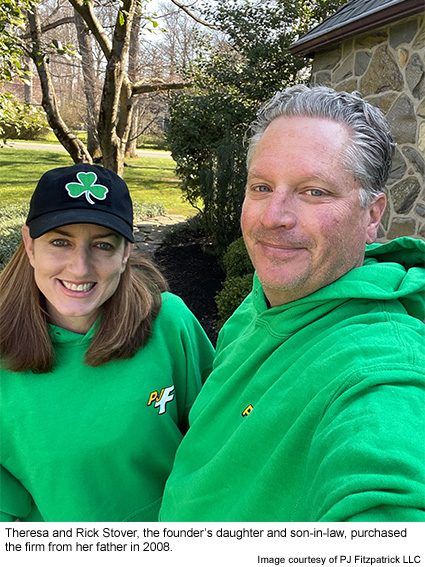Sponsored by Beacon
Contractor Profile: PJ Fitzpatrick LLC Calibrates for Growth
Coasting into its 44th year, home improvement company PJ Fitzpatrick builds on a legacy of 'standing good 'by its name

In the early 2000s, Fitzpatrick made the move to a larger facility in New Castle County, a 30,000-square-foot headquarters with 10,000 square feet of office space and the rest for product and machinery storage.
— Image courtesy of PJ Fitzpatrick LLC
As American success stories go, PJ Fitzpatrick LLC, a Delaware-based home improvement company, has the goods: a small outfit that, 44 years on, now boasts 425 employees, four divisions, five regional offices, and $115 million in annual revenue.
Founder Peter Fitzpatrick began his firm at his dining room table and, within 15 years, worked his way up to a 10,000-square-foot facility. As trends change, like how many new roofing contractors choose names that convey success and abundance, for “old timers” like Fitzpatrick, the company name holds special meaning.
“I used my name because I wanted people to know that I had to stand behind my work since my name was the business. It was personal to me,” he said. “I didn’t want a good reputation; I wanted a great reputation. Many decisions I made through the years were made because I wanted to make the brand represent quality and high standards.”
Pride of ownership has been a driving force for Fitzpatrick and continues to shape its core values today. One of those values is providing exceptional, customer-focused service while prioritizing employees' well-being. As the company has grown into a multimillion-dollar enterprise, that ethos remains a lodestar.
“I serviced existing customers before I went out on new business,” Fitzpatrick said in the company’s historical sizzle reel. “I did that because I felt it was the right thing to do, but I found that philosophy helped me build an extremely strong and loyal customer base.”
After nearly 25 years in business, Fitzpatrick felt it was the right time to make major moves. In a thriving residential housing market, he made two significant changes that would impact his company's success. The first was acquiring a competitor, Kelley's Window & Doors. This acquisition brought a new sales department and valuable best practices. Outside salesmen are crucial for closing deals and generating word-of-mouth referrals in residential remodeling and roofing — these were the foot soldiers in Fitzpatrick's business strategy.
In the early 2000s, Fitzpatrick's son-in-law, Rick Stover, joined the firm after spending the first part of his career in finance. Then came a tactical move to a larger facility in New Castle County, a 30,000-square-foot headquarters with 10,000 square feet of office space and the rest for product and machinery storage.
In 2010, with a succession plan in place, Pete Fitzpatrick hung up his proverbial shingle and sold the firm to his daughter, Theresa Stover, and her husband, Rick. The Stovers took control of the company and quickly increased revenue from $8-10 million to $24 million, largely thanks to its new outside sales department.

James Freeman, 46, was named CEO of PJ Fitzpatrick in July 2020 after years working within the construction industry.
Sprint, Idle, Reboot
PJ Fitzpatrick’s double-digit growth between 2008 and 2010 is quite impressive, considering it occurred during what would, in hindsight, be known as the Great Recession.
Those heady first years as new owners would not last, though. As company CEO James Freeman describes, the 2010s became a decade of solid, if somewhat stagnant, revenue.
“From 2010 to 2019, [PJ Fitzpatrick] never [earned] less than that $24 million number, but they never really did more than $27 [million] and some change,” Freeman said. “There was a lot of disappointment for Rick and Theresa as they watched good people, people they cared about within the business, leave because there wasn't an opportunity for them to grow in their role.”
Because PJ Fitzpatrick was started as a family-first business, the Stovers weren’t content to allow good people to leave the company and languish. By 2019, Freeman said, the couple committed to finding solutions to flourish again.
At the close of the year, while on a flight to a trade conference, Rick Stover ran into an old business acquaintance, Dave Geiger. Geiger had consulted, on and off, with PJ Fitzpatrick's founder since the early 2000s; he also built a successful firm within the HVAC trade through Horizon Home Services, which Freeman noted is a three-quarters-of-a-billion-dollar business.
Stover and Geiger were headed to the same show, and, as Freeman tells it, by the time they landed, a new partnership coalesced. Geiger and an eventual fourth partner, Tim Humphries, had a single request moving forward: the company needed to hire a seasoned CEO from the outside to oversee operations.
As 2020 began, the partners started vetting potential candidates to helm a newly supercharged PJ Fitzpatrick. With a background steeped in home improvement and experience running large companies, Geiger and Humphries put forth Freeman as their candidate; he was the universal choice of all four principals. By July, Freeman was hired as the company’s chief executive.
“And that's when I came into the play,” Freeman said. “To provide strategic guidance [from] somebody who's gone through that journey of growing [a] business and in dealing with some of the lessons that maybe we didn't have to repeat [at PJ Fitzpatrick].”
Freeman chose an interesting time to begin a new adventure. By the time he assumed his position, COVID had swept the globe and left the U.S. economy idle. In a way, the downtime gave Freeman space he otherwise wouldn’t have to focus on the things that worked, tweak things that needed adjustment, and implement his ideas for the company.
PJ Fitzpatrick, flush with cash, decided the economic dip was not a hindrance but an opportunity. In 2021, the company opened a greenfield location in Harrisburg, Pa., followed by the pickup of a specialized outfit in Fairfield, N.J. The next year, having refined its growth rhythm, the company opened a second greenfield in Pittsburgh and a third greenfield in 2023 in Bowie, Md.
With two additional partners and an experienced CEO, the Stovers found the solution to break the logjam holding back the company’s potential. The Stovers' institutional knowledge of the company and its core values, combined with their new partners' expertise and resources and Freeman’s oversight, has been an unmitigated success.
“We didn't have to take a venture into private equity because we were able to have private people who were part of [the construction industry],” Freeman explained. “And it's been a good thing because they have a tremendous amount of experience and [could] stand outside without ‘horse blinders’ and [suggest] ‘have you thought about this’ or ‘are you thinking about that?’”
Theresa and Rick Stover, the founder’s daughter and son-in-law, purchased the firm from her father in 2008.
People, Process and Structure
 PJ
Fitzpatrick is organized into three divisions: Full-line, which handles
all exterior products except doors and windows, which is its own
division, and bath remodeling, the third division. Combined, the company
is essentially a full-service remodeling firm. A fourth division
handles repairs.
PJ
Fitzpatrick is organized into three divisions: Full-line, which handles
all exterior products except doors and windows, which is its own
division, and bath remodeling, the third division. Combined, the company
is essentially a full-service remodeling firm. A fourth division
handles repairs.
Without losing that sense of family or connection with its employees, PJ Fitzpatrick created an extensive onboarding process. Following a general overview, employees hired into sales go onto a sales-oriented onboarding; technicians and roofers have their own onboarding, and so on. The specialization reinforces the skills that each employee was hired for but does not pigeonhole them.
In addition to a thorough entrée into the company, Freeman acknowledged that certain acquisitions have brought the best of those organizations to PJ Fitzpatrick. For example, he talked about how acquiring the New Jersey company Bay Roofing brought with it a particular knowledge of roofing systems that were geographically unique compared to homes in Pennsylvania, Maryland, or Delaware.
The New Jersey outfit had a more robust offering than architectural asphalt shingles, including slate, metal and composite shingles.
“So, as we went market to market, we consistently updated our playbook, and most of the updates in our playbook were not because we did something right,” Freeman said with sardonic humor.
Freeman said that each acquisition and greenfield site presented inevitable growing pains and unforeseen issues, which were considered opportunities to "refine" the process.
“When we went to our first market, we relied too heavily on the people already existing in our business to lift us and bring us to that new market,” he said. “We wanted to grow responsibly to create opportunities for our people, so, after Harrisburg, we never went into a new market without having an existing senior management team to support that market.”
To bolster its growth, Freeman knew what he wanted regarding training and workplace development: an in-house “school,” affectionately known as PJ University or PJU.
“The whole university piece has always been my dream,” he said. “[W]hen I stand in front of the people that work for me — as well as those working for [my] people — they're all teammates, and they're all leaders.
“They might not be up on a roof [with] hammer and nails, [or] out in-home selling. Still, they're all supporting the people [at the company] … so it's important for us that when we want to provide the best for our people, a lot of times that's helping them find their next opportunity.”
He credits the Stovers for allowing him the bandwidth to create a robust program that invests so much in its employees. He believes his employees mirror that in their pride of craftsmanship, sensitivity during the education and selling process, and collective sense of responsibility.
“I've always dreamed of having that type of environment in our business and was blessed enough to have owners that believe that we're an education organization just as much as we are an exterior modeling organization,” Freeman said. “One of the things that helped us create strength in our recruitment and also buy into our culture was the way that we approach PJ University.”
Within PJU, the company offers management tracks to help groom future leaders, which seems more straightforward than hiring from the outside and asking a manager to conform to new methods or unfamiliar processes.
The scope of the training is broad-based, whether it’s a developmental track that moves a person forward in a role they’re currently in or hopes to ascend toward — say, from apprentice to roofer to lead installer — to the leadership track that takes emerging leaders and inculcates them with the knowledge and interpersonal skills that make a manager effective.
“Often [companies] promote people to their level of incompetence,” Freeman explained, referencing a line from “First, Break All the Rules” by Gallup’s Marcus Buckingham and Curt Coffman. “Promotions often happen without building the skills, strengths, and capabilities they need to be successful, and [managers] hope they catch it on the fly.
“How many people have been promoted to be managers and never got any education on writing a review, providing constructive criticism, handling challenging, stressful moments, and navigating customer conversations?”
PJ Fitzpatrick LLC
Headquarters: New Castle, Del.Specialty: Home Exterior Remodeling, Reroofing, Bathrooms
Number of Employees: 425
Revenue:$115 million annually
Website: pjfitz.com
A Stitch in Time Includes Safety and Technology
Recalling Peter Fitzpatrick's words, an existing customer is always the priority. That hasn’t changed; it has evolved. With the advent of software tracking and other modern technologies, PJ Fitzpatrick maintains its loyal client base more efficiently and effectively than ever.
“One of the things we look to do in every situation … [is] fulfill the four-star warranty obligation we provide,” Freeman said. “That lifetime warranty [includes using] set products we use and … an airflow system that will ensure the air flows in through an edge vent at the base of the roof and through a ridge vent.”
It's a technician’s version of the founder’s philosophy: stand good for every job and do what it takes to make the customer happy and heard. That philosophy and the investment in its employees keeps repairs to a minimum, thus a lack of need for a full-time repair division.
Safety is always in the news due to the high prevalence of falls and other on-site accidents in roofing. Freeman says the advent of new technologies has made the need for many on-roof trips, including take-offs and inspections, nearly obsolete.
For example, the company makes use of HOVER, a technology company providing software that can generate precise measurements and convert them into 3-D renderings more precisely than hand measuring.
“As opposed to my team being up on a roof, taking measurements for 45 minutes to an hour … they could get injured, they could make a mistake,” Freeman said.
Freeman explained that the company’s efficiency tools also help with training and feedback.
“They have ‘Rillavoice,’ which is an AI solution that listens to the conversation [between a salesman and homeowner], obviously with the customer's permission, and then gives feedback; for example, are they being empathetic by allowing the customer to have time to speak?”
Wrapping up, Freeman, 46, shared a bit of himself: He and his wife Melissa live in Philly and have two kids, Isabella, 16, and Seamus, 11. After hearing their son’s name and taking note of his sporting a Fitzpatrick green-colored polo, it begged the question of whether getting a job at the company helped if one was Irish. Appreciating the humor, he suggested, “It couldn’t hurt.”
Freeman offered his modus operandi: “I look for ways where we can responsibly differentiate ourselves because we are, in many cases, the more value-driven decision that customers have to make. We're not going to be the lowest price on the block, but the long-term value and the quality expectation will be at a higher level.”
Looking for a reprint of this article?
From high-res PDFs to custom plaques, order your copy today!







